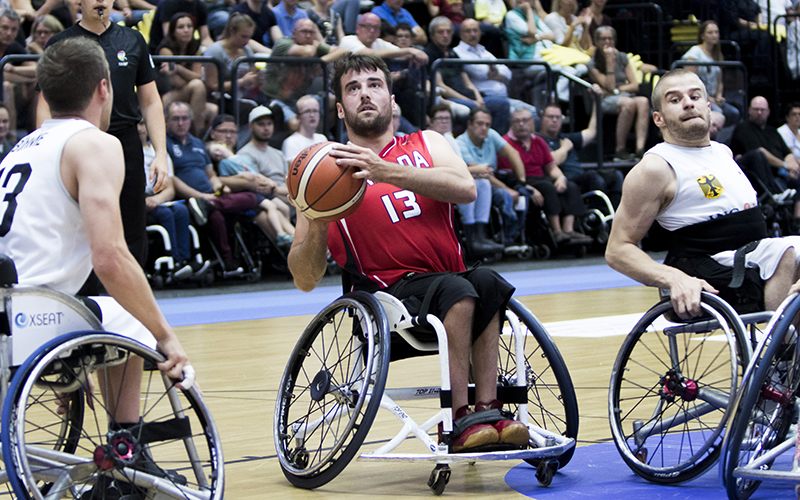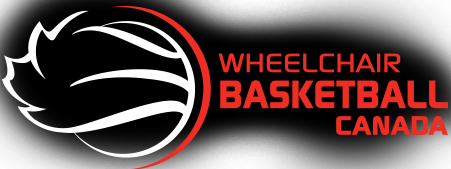
The road to Tokyo is not only longer, but a bit lonelier too for Team Canada wheelchair basketball athlete Jonathan Vermette, who is well versed when it comes to the need to adapt to unforeseen circumstances. Like most, the past year has been a major adjustment for the high-performance athlete.
“Right now, I don’t have full control of my training situation, so I’m trying to make the most out of what I can do and just work on the little things to help me stay as ready as possible,” said the native of Sherbrooke, Que.
Vermette doesn’t have access to a gym, so with no hoop to shoot on and the arrival of winter, he admits it’s been difficult to stay motivated. Training solo is less than ideal for someone who thrives in a team environment.
“I would say the hardest part is really the training. I’m not a gym rat. For me to really train hard, I need to have that carrot at the end of the stick. I need shorter-term goals, which is harder right now. But you have to adapt and find new ways to train and keep in touch with your teammates. I think the key word is ‘adapt’.”
While he’s been keeping busy with school, Vermette also recently did something he rarely does – open up about his family’s story in a very public forum. With the help of Radio-Canada, Vermette shared a first-person account of the 2000 car accident in which he, his twin brother Philippe and younger sister Karine were seriously injured and their mother was killed.
“It’s not the kind of thing I do very often and it’s not something I really like to do. At one point, it’s nice to move on. But I thought the journalist did a good job of finding the balance between basketball and relating it to my story without taking a sensationalized approach.”
The story chronicled his evolution in basketball from the accident at nine years old to now, as the 29-year-old Paralympian. While Vermette battles it out with intensity on the court, he tends to shy away from the spotlight off of it.
“I’m more of an under the radar type of guy.”
But he did use the visibility of the article to share how much sport – and wheelchair basketball in particular – helped him find a way forward after the accident.
“Sport was huge at first because it made me move and be active. I got to meet people who maybe weren’t dealing with the same situation as me, but we shared common stuff like having a disability. I think socially it was really good because sport put me in this environment where I was comfortable and I was able to thrive and set goals. It really allowed me to go forward.”
There was no basketball program back home in Sherbrooke, so Vermette’s father took it upon himself to start a team for his three children. They recruited some neighbours and friends, and in a matter of days they had enough players to form a team – les Patriotes de Sherbrooke.
“Without my dad, maybe I would have never started playing wheelchair basketball and who knows what my future would have been. Sport really helped me see my disability as something I could really deal with and use it to do something great.”
Fast forward to today and Vermette, a Rio 2016 Paralympian and two-time silver medalist at the Parapan Am Games, is preparing for his seventh season with the Canadian Men’s Wheelchair Basketball Team.
He just had the opportunity to reconnect with some teammates and move closer to playing some real basketball at a recent National Team camp – the first since March. The training camp was the first in a series designed to keep Team Canada on track for Tokyo.
“It was great to be back in a real gym with a proper setting to practice in and be in an environment where I’m being pushed by my teammates. Especially mentally, I think it was something that I needed right now. It’s hard in the long term to train by yourself, to lift and do everything on your own. I was super pumped to see the guys and be able to push with them.”
As the calendar shifts to 2021, Vermette still has his sights set on representing Canada at his second Paralympics. True to his ability to adapt, he’s going into Tokyo with a more resilient frame of mind.
“Even though we want to set goals, I would say don’t go there with all of these expectations. You never know what can happen during a tournament. Rio 2016 really didn’t go as planned and when I reflect back on it, I can’t say there were more positives than negatives. The experience was amazing, but we really didn’t play the way that we could.
“While I still have goals for Tokyo, they won’t be as specific. I’m just going to live in the moment and enjoy it. My goal is to finish the tournament and be proud of what I did and what we have done as a team. When it’s all said and done, I just want to have the feeling that we really gave it our all and we got the place that we deserved.”
Follow Jo’s journey with Team Canada on the road to Tokyo:
Facebook: @wheelchairbasketballcanada
Twitter: @wcbballcanada
Instagram: @wheelchairbasketballcanada


